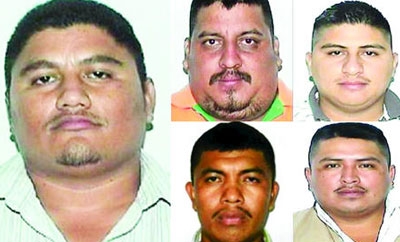Mexican authorities have caught the alleged leader of a Guatemalan drug trafficking ring accused of massacring eight policemen in an apparent revenge killing, capping off an operation that has been a PR coup for the government but may have little lasting impact.
Mexico’s Attorney General’s Office (PGR) captured Eduardo Francisco Villatoro Cano, alias “Guayo Cano ” in Tuxtla Gutierrez, approximately 100 miles from the Guatemalan border, reported Siglo 21. Villatoro is thought to be the head of a drug trafficking organization based in the city of Huehuetenango, in western Guatemala, and to be responsible for an assault in June on a police substation in nearby Salcaja that left eight police officers dead and the station chief missing.
The chief’s dismembered body later turned up in a river, and accusations have emerged of his involvement in the theft of money and drugs from the group responsible. A month after the event, nine suspects were arrested for the crime, including at least one police officer, but Villatoro remained at large.
Guatemalan authorities had been piling the pressure on Villatoro by arresting his brother, placing his wife and sister under house arrest and offering a reward of $12,000 for information leading to his capture. According to Prensa Libre, at the time of his arrest, Villatoro was accompanied by Edgar Waldiny Herrera Villatoro, alias “Gualas,” also wanted for the massacre, and bodyguards from Mexico’s Gulf Cartel.
SEE ALSO: Guatemala Profiles and News
InSight Crime Analysis
The capture of Villatoro has been hailed by Guatemalan President Otto Perez Molina, who declared Villatoro’s gang dismantled. The operation against the group has been one of the biggest carried out against organized crime under Perez, and was likely spurred by the need to demonstrate the state’s ability to react when it is overtly challenged.
The high-profile massacre of police in their substation was seen as just such a challenge. However some sources have suggested that while authorities have been successful in taking down the group’s network of hitmen, its transportation and money laundering structures have remained intact. If that is the case, the effect of Villatoro’s capture remains unclear.
SEE ALSO: Zetas in Guatemala
Even if the group has been taken out, it barely scratches the surface of the country’s extensive organized crime presence. As in the case of Villatoro, who was identified in the Guatemalan press as working with the Gulf Cartel — although this was likely a reference to the Gulf breakaway group the Zetas — these criminal networks are tightly intertwined with powerful Mexican cartels, particularly the Sinaloa Cartel and the Zetas, which can always find local partners to fill any void.

